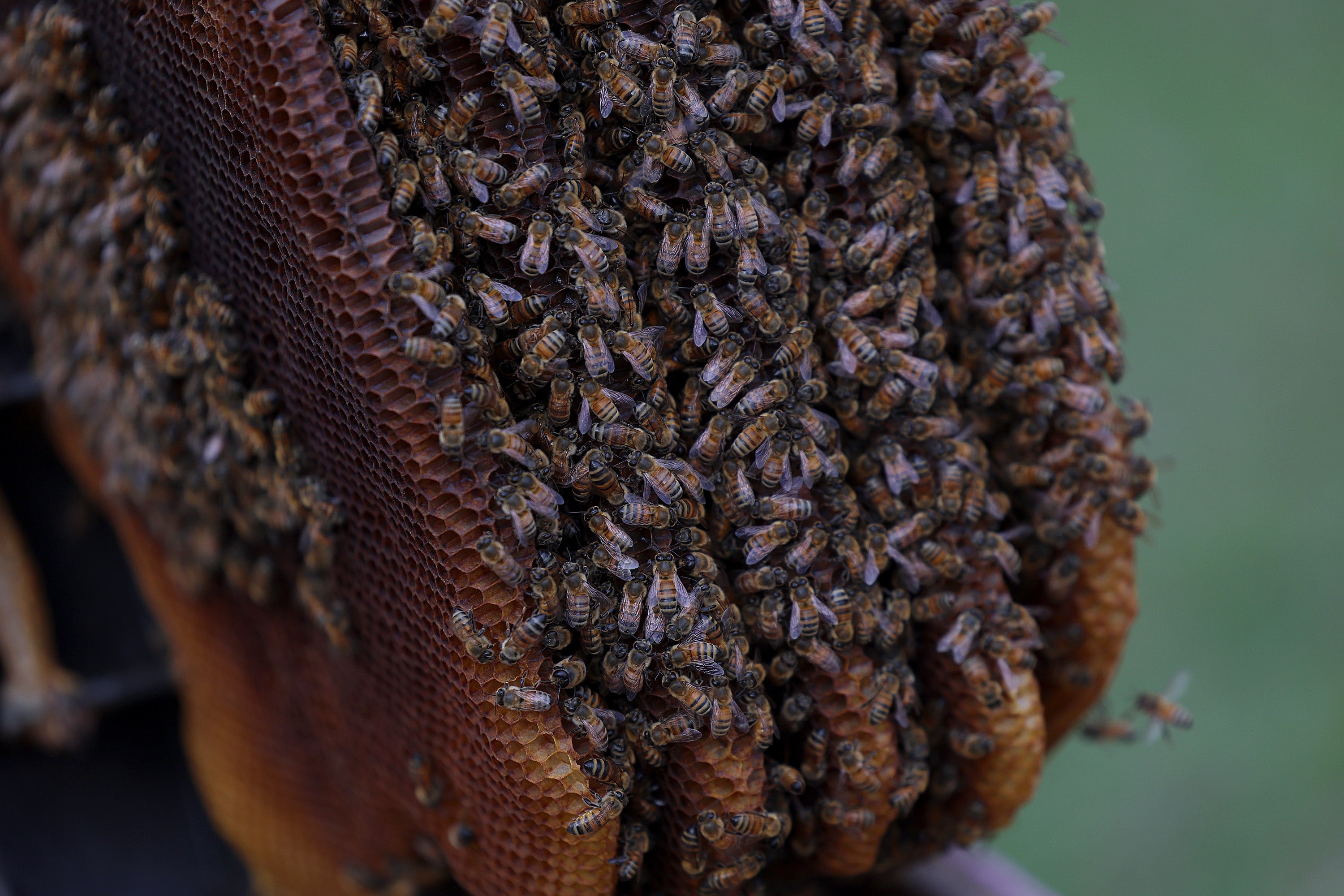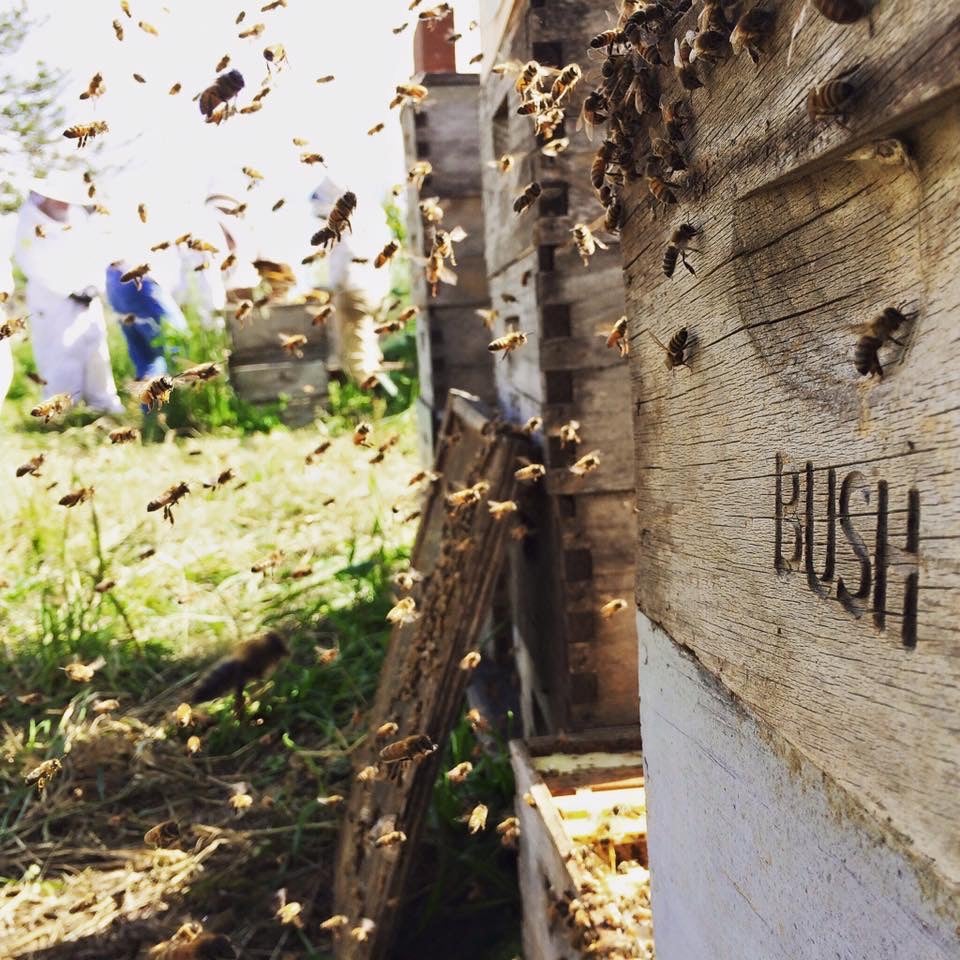Millions of honeybees are dying — and no one is sure why
Do you enjoy your morning cup of joe? Maybe you have some almond milk in your fridge, or like adding a little extra nutmeg to your eggnog? Or, do you (like everyone else) rely on fruits and vegetables to maintain a healthy diet?
If so, beware: All of those foods — and more — are in danger, because honeybees are suddenly dying by the millions.
Entomologists from Washington State University say U.S. commercial beekeepers could see honeybee losses of 60 to 70 percent this year. This comes after a survey by the Apiary Inspectors of America revealed that beekeepers lost 55 percent of their colonies last year, the highest death rate recorded since they started keeping track in 2011.
“It impacts everyone’s food security,” entomologist Dr. Juliana Rangel from Texas A&M University told The Independent. “Fruits and vegetables are pollinated by bees, and we love our fruits and vegetables. We love our coffee, which is pollinated by bees. We may often take this for granted.”
“This should be a major concern for all of us,” she added.
The problem is, no one is exactly sure why this is happening.

Pesticides, food supply and weather could all play a role
While experts aren’t exactly sure what caused the recent rise in honeybee deaths, there are several factors that could be to blame.
One of those factors is a poor food supply for the bees themselves. Changing weather patterns can confuse the bees, causing them to leave the hive too early or too late and look for food that isn’t actually in bloom.
Rapidly changing temperatures, even over a matter of weeks, can be bad news for a colony, Rangel told The Independent.
“[The bees] think, oh, it's warm enough, I'm going to go out and look for food,” Rangel said. “But there's actually no food. They come back, and they spent a lot of the reserves they had, but they didn't bring any food back.”
“And if they're at the verge of running out of reserves, which is honey, then they can die further,” she added.
Pesticides could also play a role.
Scientists are currently testing the impacted colonies for pesticide poisoning, according to Rangel, but official results could take months to get.
Michael Bush, a beekeeper from Nebraska who has been caring for the pollinators since 1974, tells The Independent he thinks pesticides may be to blame, too. But they’re “not the only problem,” he said.
Rangel notes that many of the commercial beekeepers she’s spoken to haven’t done anything different recently, meaning that beekeepers and their management of their bees likely isn’t to blame.
“In the last six months, they didn't really change their management style. In other words, they didn't do anything different than what they've been doing for decades,” Rangel said. “Their likelihood depends on, and that of their employees depends on, maintaining healthy bees. So it's in their interest to keep their bees alive.”

When will scientists have answers?
Not anytime soon — especially given the massive budget cuts and layoffs happening across the federal government this year.
Rangel says President Donald Trump and Elon Musk’s widespread cuts to federal agencies “couldn’t have come at a worse time,” given that Agriculture Department laboratories are often responsible for studying mass bee deaths.
DOGE has slashed billions in USDA funding and offered staff buyouts across the board since Trump took office in January.
“The entire research community is hurt with Trump's cuts right now,” Randy Oliver, a beekeeper and biologist from California, told The Independent.
Rangel also noted that future surveys that cover the transition from winter to spring could also provide more accurate numbers.
“Things could be worse,” she said, “because in the months of March and April is when we start seeing fluctuating temperatures.”
The White House did not respond to a request for comment before deadline.

What impact will these deaths have?
There’s no need to panic just yet. If beekeepers have a particularly bad year with a high death rate, they can typically recover the next, according to Dr. Dave Goulson, an entomologist with the University of Sussex.
But if heavy deaths — like those recorded last year — continue for multiple years, we could be in trouble.
“If this were to keep happening, then beekeepers would quickly lose all their bees, and that would be catastrophic,” Goulson told The Independent.
Honeybees are responsible for pollinating roughly one-third of our food supply. The impact isn’t limited to the U.S., either. For example, 80 percent of the world’s almonds are grown (and pollinated) in Northern California.
Goulson noted similar issues are facing other pollinators, including wild bees not cared for by beekeepers.
“This isn't just about honeybees,” he said. “There's a whole raft of other pollinators out there that are also really important and they don't have a champion.”
Beekeepers themselves will also face economic consequences. Oliver told The Independent his family’s beekeeping operation saw heavy losses this year.
“They laid off a couple of employees,” he said. “They’re not going to make any money this year.”
Rangel warns this isn’t an issue to take lightly.
“Our food security depends on the honeybees and native pollinators,” she said.
In response to this story, the USDA told The Independent:
“USDA is aware of the unusual losses to our nation’s honey bee colonies and is concerned about its potential impact on food production and supply. USDA Agricultural Research Service scientists are working closely with federal partners, stakeholders, and impacted parties to identify the source of this agricultural challenge.
Secretary Rollins is committed to preserving essential positions and will ensure that critical services remain uninterrupted. USDA is committed to maintaining the personnel and resources needed to continue to support USDA’s mission and will make it a priority to allocate personnel resources as needed to meet mission-critical functions going forward. Secretary Rollins fully supports the President’s directive to improve government, eliminate inefficiencies, and return USDA to a farmer-first agency.”
댓글
댓글 쓰기